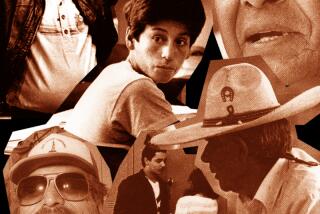Expanded ‘7:30’ Looks at AIDS and Blacks
- Share via
KCET’s five-minute news program “7:30” is expanding to a half-hour tonight and Friday to examine the effect of AIDS on Los Angeles minorities and, reporters at the public-TV station hope, to help keep the deadly epidemic from reaching the levels of New York.
“At Risk: Blacks and AIDS,” produced and anchored by Marlo Bendau, airs tonight at 7:30 p.m. on Channel 28. “At Risk: Hispanics and AIDS,” produced and anchored by Valerie Zavala, will be telecast Friday at 7:30 p.m., with a simulcast in Spanish on XPRS-AM (1090).
“7:30,” which follows the “The MacNeil/Lehrer NewsHour,” is usually comprised of 90 seconds of local headlines and then a 3 1/2-minute report on an aspect of Southland living. While the news program occasionally does a multi-part series (such as a recent examination of Southern California families), this is only the second time in its one-year history that it has expanded to a half-hour. The first was Oct. 2, after the Whittier-based earthquake.
Celeste Durant, managing editor of “7:30,” said the half-hour editions were undertaken partly to test the staff’s ability to produce them (with an eye toward possible expansion of “7:30”) and partly because they felt it was a more effective way of addressing the subject of AIDS.
While Los Angeles has fewer minority AIDS cases than New York, Miami and Newark, N.J.--mostly due to the absence of “shooting galleries” (abandoned buildings where drug users can shoot up, often sharing needles)--Zavala and Bendau said they found local authorities worried nonetheless.
Current statistics from AIDS Project L.A. show that blacks account for 12% of Los Angeles County’s population and 14% of its AIDS cases; the comparable figures for Latinos are 28% and 15%, respectively. Zavala said that experts call the 15% figure for Latinos “very conservative” because the undocumented immigrant population probably doesn’t seek health care.
In New York, by contrast, blacks account for 23% of the population and 30% of the AIDS cases; Latinos comprise 20% of the population and 24% of the AIDS cases, according to the New York City Health department.
“Since, nationwide, Hispanics are overrepresented among AIDS cases and underrepresented in L.A., authorities say this is a ‘window of opportunity,’ ” Zavala said. “In three or four years, we could be looking at the opposite.”
Bendau said she and Zavala were urged by health officials and others to “get the word out” and capitalize on this opportunity.
“The focus of (my) story,” Bendau said, “is not at all to point at what (has gone) wrong. It’s to say what is the scope of the problem, what must the black community do now and what must the white and black community together do to take advantage of the fact that we don’t have the horrible statistics that New York and Miami have.”
Both Zavala and Bendau said that their reports will show how the social factors of poverty, illiteracy and inadequate health care, along with cultural, religious and sexual attitudes, contribute to the spread of AIDS in the two communities.
Each of the AIDS shows is comprised of taped interviews with AIDS victims, community volunteers, medical officials and religious leaders, followed by in-studio discussions with community representatives about the possible solutions to each group’s problems.
Bendau’s panelists include state Sen. Diane Watson (D-Los Angeles), who heads the Senate committee on health and human services; Dr. Xylina Dean, director of the infant follow-up clinic at Dr. Martin Luther King Jr. Hospital, and Rev. Carl Dean of the Minority AIDS Project L.A.
Zavala’s guests on Friday will be Eunice Diaz, from the L.A. County Commission on AIDS; Daniel Laracq of AIDS Project L.A. and Dr. Julio Diaz, who works with AIDS patients.
Los Angeles City Council member Richard Alatorre, who represents East Los Angeles, declined an invitation to appear on the program because he objected to the stereotypical portrayal of Hispanics in the script. He said Wednesday, however, that he would not attempt to block the airing.
More to Read
The complete guide to home viewing
Get Screen Gab for everything about the TV shows and streaming movies everyone’s talking about.
You may occasionally receive promotional content from the Los Angeles Times.






